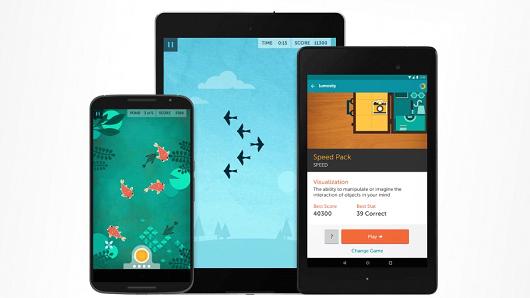Lumos Labs, maker of the popular Lumosity app, has agreed to a $2 million settlement with the Federal Trade Commission (FTC) over accusations that the marketing and descriptions of the company’s “brain training” service constitute deceptive advertising.
The FTC said Tuesday that Lumosity made “unfounded claims” that its games could help users do better at work and school and help reduce the effects of conditions including Alzheimer’s, attention deficit hyperactivity disorder, and traumatic brain injury.
“Lumosity preyed on consumers’ fears about age-related cognitive decline, suggesting their games could stave off memory loss, dementia, and even Alzheimer’s disease,” said Jessica Rich, the director of the FTC’s Bureau of Consumer Protection, in a statement. “But Lumosity simply did not have the science to back up its ads.”
The San Francisco-based company, founded in 2005, says it has more than 70 million registered users around the world, who are able to play its games on the web and on apps for iPhone and Android devices. Lumosity said in a statement Tuesday that it intends to continue offering its products to users.
“Neither the action nor the settlement pertains to the rigor of our research or the quality of the products—it is a reflection of marketing language that has been discontinued,” the company said. “Our focus as a company has not and will not change: We remain committed to moving the science of cognitive training forward and contributing meaningfully to the field’s community and body of research.”
The company also allegedly failed to notify customers that some testimonials on its website “had been solicited through contests that promised significant prizes, including a free iPad, a lifetime Lumosity subscription, and a round-trip to San Francisco,” according to the FTC.
Under the terms of the settlement, the company agreed to notify customers who signed up for auto-renewal subscriptions between Jan. 1, 2009 and Dec. 31, 2014, about the FTC’s allegations and give them the opportunity to cancel their subscriptions. The company also agreed not to make further scientific claims without “competent and reliable scientific evidence.”
Lumosity, which provides brain researchers free access to its brain-training tools through its Human Cognition Project, says it intends to continue to support research into the effectiveness of its product.
In a statement to Fast Company, a Lumosity spokeswoman said:
The recent peer-reviewed clinical test published in the journal PLOS One is a large, randomized, active-controlled trial of our cognitive training program. The study reported that participants who trained with Lumosity for 10 weeks improved on an aggregate assessment of cognition. Going forward, a key focus of our ongoing research is to build on these studies to better understand how training-driven improvements on tests of cognition translate to performance in participants’ everyday lives.
Agencies/Canadajournal
 Canada Journal – News of the World Articles and videos to bring you the biggest Canadian news stories from across the country every day
Canada Journal – News of the World Articles and videos to bring you the biggest Canadian news stories from across the country every day



